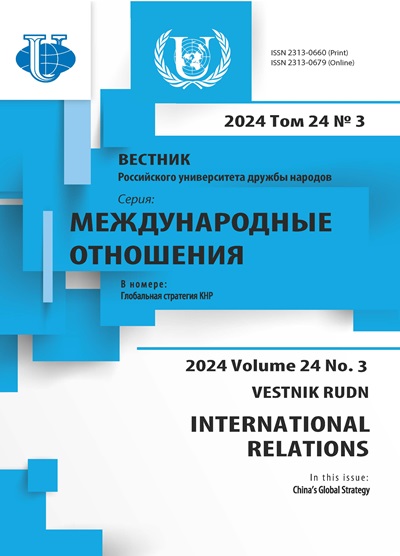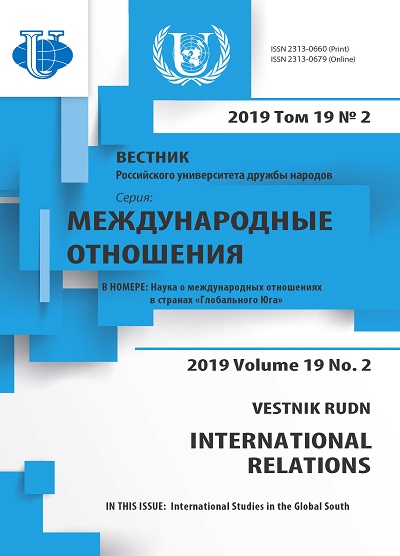Голлизм и неоголлизм: преемственность и динамика внешнеполитической стратегии Франции
- Авторы: Корнилов А.А.1, Афоньшина А.И.1
-
Учреждения:
- Нижегородский национальный исследовательский университет имени Н.И. Лобачевского
- Выпуск: Том 19, № 2 (2019): Наука о международных отношениях в странах «Глобального Юга»
- Страницы: 256-263
- Раздел: МИР И БЕЗОПАСНОСТЬ
- URL: https://journals.rudn.ru/international-relations/article/view/21463
- DOI: https://doi.org/10.22363/2313-0660-2019-19-2-256-263
Цитировать
Полный текст
Аннотация
В статье авторы рассматривают основные внешнеполитические приоритеты и цели голлизма и неоголлизма, выявляя те аспекты, которые остались неизменными на протяжении десятилетий, и те, которые трансформировались вместе с изменением внешнеполитической обстановки. Авторы также характеризуют понятие «величие», часто употребляемое генералом Ш. де Голлем, и оценивают влияние концепции «величия Франции» на её внешнюю политику. В качестве основных приоритетов внешней политики Франции при Шарле де Голле выступали независимая внешняя политика Франции, изменение международного статус-кво в биполярном мире и восстановление статуса Франции как великой державы. Говоря о внешней политике неоголлистов, то есть Ж. Ширака и Н. Саркози, можно сказать, что основные приоритеты Франции, по сути, не поменялись, однако способы достижения внешнеполитических целей часто были иные. Оба президента старались развивать интеграцию в рамках ЕС, пусть даже путем усиления наднациональных институтов, и интеграцию с НАТО (Н. Саркози даже вернул Францию в военные структуры НАТО). При неоголлистах Париж также проводил активную политику в регионе Средиземноморья, сотрудничая не только с традиционными партнерами (арабскими странами), но и предпринимая попытки по восстановлению отношений с Израилем. Н. Саркози выступил с идеей создания Средиземноморского союза, целью которого было усилить влияние Франции в регионе, наладить сотрудничество между средиземноморскими странами и решить многочисленные накопившиеся проблемы, которые стоят перед ними. Однако данная идея не была воплощена в жизнь именно в том формате, в каком задумывалась. В итоге неоголлисты следуют основным принципам генерала Ш. де Голля, также отвечая при этом на вызовы современности. Следует отметить, что в данном исследовании авторы комплексно рассматривают внешнеполитический курс французских президентов именно с точки зрения политики неоголлизма, стараясь оценить степень преемственности курса на протяжении десятилетий, а также актуальность положений голлизма для Франции XXI в.
Ключевые слова
Об авторах
Александр Алексеевич Корнилов
Нижегородский национальный исследовательский университет имени Н.И. Лобачевского
Автор, ответственный за переписку.
Email: region@imomi.unn.ru
доктор исторических наук, профессор, заведующий кафедрой зарубежного регионоведения и локальной истории Института международных отношений и мировой истории
Нижний Новгород, Российская ФедерацияАлександра Ильинична Афоньшина
Нижегородский национальный исследовательский университет имени Н.И. Лобачевского
Email: aleksandra.inbox@mail.ru
аспирант Института международных отношений и мировой истории
Нижний Новгород, Российская ФедерацияСписок литературы
- Зверева Т.В. Внешняя политика Франции после прихода к власти Николя Саркози // Мировая экономика и меж¬дународные отношения. 2008. № 6. С. 34—48.
- Зверева Т.В. Основные направления внешней политики Франции в условиях глобализации: дис. ... д-ра полит. наук. М., 2014.
- Карева Д.О. Средиземноморская политика Франции в конце XX — начале XXI вв.: дис. ... канд. ист. наук. М., 2015.
- Нарочницкая Е.А. Внешнеполитическое наследие голлизма в современной Франции // Франция на пороге перемен: экономика и политика в начале XXI века: материалы Всероссийской научной конференции, 7 декабря 2015 г. М.: ИМЭМО РАН, 2016. С. 210— 221.
- Панюжева М.М. Французская политика Н. Саркози (2007—2012 гг.) // Обозреватель — Observer. 2013. № 11 (286). С. 118—127. URL: http://www.observer.materik.ru/observer/N11_2013/118_127.pdf (дата обращения: 20.06.2018).
- Пупыкин Н.И. От голлизма к неоголлизму: эволюция идеологии и политики // Диалог со временем. 2010. № 33. С. 331—341. URL: http://ecsocman.hse.ru/data/2012/12/26/1251396117/19.pdf (дата обращения: 10.06.2018).
- Bagayoko-Penone N., Cazelles C. Vers une gestion interministérielle des sorties de conflits? // Horizons stratégiques. 2007. Vol. 5. No. 3. P. 130—151. URL: https://www.cairn.info/revue-horizons-strategiques-2007-3-page-130.htm (accessed: 10.06.2018).
- Boniface P. La politique étrangère de Nicolas Sarkozy. Rupture ou continuité? // Compte rendu de la conférence. Maison de l’Europe, 13 avril 2010. Institut de relations internationales et stratégiques. URL: https://www.iris-france.org/ docs/kfm_docs/docs/cr-conferences/2010-04-13-la-politique-etrangere-de-nicolas-sarkozy.pdf (accessed: 10.06.2018).
- Charillon F. La politique étrangère de la France: l’heure des choix // Politique étrangère. 2007. No. 1. P. 139—150. DOI: https://doi.org/10.3917/pe.071.0139.
- De Charrette H. Nicolas Sarkozy et la politique étrangère de la France: entre changement et continuité // Revue internationale et stratégique. 2008. Vol. 70. No. 2. P. 7—12.
- Fabius L. Diplomatie française: passer de la posture à la stratégie // Revue internationale et stratégique. 2004. Vol. 53. No. 1. P. 53—56. DOI: https://doi.org/10.3917/ris.053.0053.
- Gaillard M. France — Europe: Politique européenne de la France de 1950 à nos jours. P.: De Boeck Supérieur, 2010.
- Lequesne C. La politique étrangère de Jacques Chirac ou la France sans surprise // DGAP-Analyse Frankreich. 2007. No. 2. Berlin: Forschungsinstitut der Deutschen Gesellschaft für Auswärtige Politik e.V. URL: https://www.ssoar.info/ ssoar/bitstream/handle/document/13137/ssoar-2007-lequesne-la_politique_etrangere_de_jacques.pdf?sequence=1 (accessed: 10.06.2018).
- Lequesne C., Vaïsse M. La politique étrangère de Jacques Chirac. P.: Riveneuve, 2012.
- Rémond R. Les droites en France. P.: Éditions Aubier-Montaigne, 1982.
- Vaïsse M. La grandeur. Politique étrangère du général de Gaulle 1958—1969. P.: Fayard, 1998.
- Vaïsse M. La France et l’OTAN: une histoire // Politique étrangère. 2009a. No. 4. P. 861—872. DOI: https://doi.org/ 10.3917/pe.094.0861.
- Vaïsse M. La puissance ou l’influence. La France dans le monde depuis 1958. P.: Fayard, 2009b.
- Védrine H., Boniface P., Lequesne C. La politique étrangère de la France en débat // Esprit. 2018. Mars. No. 3. P. 103—116. doi: 10.3917/espri.1803.0103.
- Zuqian Z. La politique étrangère de la France entre continuité et ajustements post-guerre froide // Revue internationale et stratégique. 2002. Vol. 45. No. 1. P. 113—120. doi: 10.3917/ris.045.0113.











